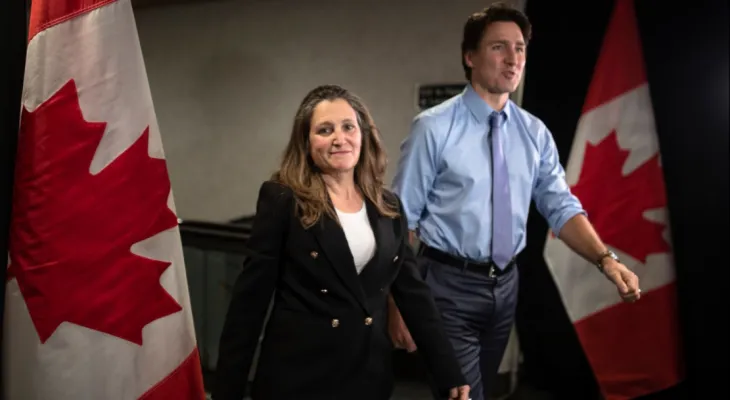Search here
Newspaper
Search here

Arab Canada News
News

Published: December 20, 2024
The resignation of Canadian Deputy Prime Minister and Minister of Finance Chrystia Freeland from Justin Trudeau's government shocked the political scene in Canada, as it came after a series of events that revealed internal tensions between Freeland and Trudeau regarding the management of economic and financial issues.
Events Leading to the Resignation
1. Freeland's Dismissal from the Finance Portfolio:
During a Zoom call on Friday, Trudeau informed Freeland that she would not continue as Minister of Finance, and a new position was offered to her as the Lead Coordinator for Canadian-American relations while retaining her position as Deputy Prime Minister.
2. Ambiguity in Communication Between the Two Parties:
Despite ongoing communication between Freeland's team and the Prime Minister's office over the weekend, there were no signs that she was considering resignation. In fact, messages showed her readiness to work in the new role.
3. A Sudden Decision:
Only two hours before announcing her resignation on social media, Freeland sent a message requesting to speak with Trudeau, which was the first indication of a real problem.
Reasons for the Disagreement
According to sources close to Freeland, the main disagreement between the two sides was related to how financial affairs should be managed and Canada's readiness to face economic challenges associated with Donald Trump's policies. Trump threatened to impose a 25% tariff on Canadian imports, which Freeland considered required greater financial flexibility than Trudeau was willing to agree to.
Implications of the Resignation
1. Weakening of Government Leadership Image:
The resignation came at a sensitive time when the Liberal Party is suffering from declining popularity. This development reinforces the impression of internal conflicts that may affect the government's effectiveness.
2. Economic and Political Impact:
With Freeland's departure, the government loses one of its prominent faces in managing financial and diplomatic files. This could affect the government's ability to deal with upcoming economic challenges, especially amid American tariff threats.
3. Questions About Trudeau's Future:
With increasing criticism of Trudeau within his party, this resignation may signal a rise in calls for leadership change or radical policy adjustments.
Conclusion
The resignation of Chrystia Freeland highlights internal tensions in Trudeau's government and raises questions about the stability of Liberal leadership in Canada. In light of increasing economic and political challenges, the government will need a clear strategy to regain Canadians' confidence and address unresolved domestic and external issues.
Comments